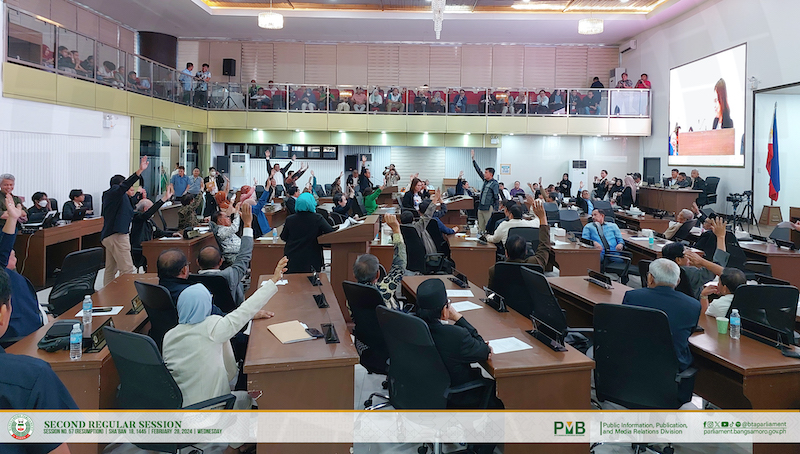 The Bangsamoro Parliament in session. Photo courtesy of the BTA Parliament
The Bangsamoro Parliament in session. Photo courtesy of the BTA Parliament
COTABATO CITY (MindaNews / 01 March) — Three governors from the Bangsamoro Autonomous Region in Muslim Mindanao filed this week a petition before the Supreme Court challenging the constitutionality of the recently passed Bangsamoro Local Government Code (BLGC).
Governor Abdusakur Tan of Sulu, Governor Mamintal Adiong of Lanao del Sur and Governor Bai Mariam Mangudadatu of Maguindanao del Sur filed a petition for certiorari and prohibition at the SC on February 26, to declare as unconstitutional and invalid the BLGC or Bangsamoro Autonomy Act 49.
The three governors were authorized to file the petition by their respective provincial boards as well as the League of Municipalities and League of Barangays of their respective provinces.
The petitioners are asking the High Tribunal for the immediate issuance of a status quo ante order, temporary restraining order and/or writ of preliminary injunction to stop the implementation of the BLGC.
In a news release, the BARMM Governors Caucus said the Code is “riddled with provisions that violate the Constitution.”
They argued that the local government code of the BARMM must not only be in accordance with the Constitution and the Bangsamoro Organic Law but must also respect and recognize the constitutionally guaranteed local autonomy of local government units (LGUs).
“The vague and broad definition of the BARMM regulatory authority over its constituent LGUs in the BLGC amounts not only to the exercise by the BARMM regional government and the Chief Minister of the power of supervision but of unbridled power and control over LGUs that is abhorred by the Constitution, the BOL and the LGC (Local Government Code),” the petition stated.
One of the key issues being questioned is the provision in the BLGC granting the Chief Minister the power to investigate and adjudicate administrative cases involving local government executives.
This, the petitioners said, encroaches on the disciplinary authority of the President and local councils under the Constitution and the LGC.
Another is the power granted by the BLGC to the Chief Minister to appoint holders of vacant elective positions in the LGUs.
They argued that the authority to appoint local elective officials under certain circumstances is vested in the President by the Constitution and the LGC.
They also challenged the BLGC provisions on additional disqualifications for local elective positions in the BARMM, including the failure to attend the mandatory capacity building program and violation of the anti-dynasty provisions in the Code.
“The petition contends that the BLGC, as a subordinate law to the LGC, cannot amend the LGC which provides for the qualifications for election of local executives in the country,” the petition said.
They further argued that under the Constitution, only Congress is empowered to define and prohibit political dynasties.
Adiong said the filing of the petition seeks “to clarify the boundaries of power of the national, regional and local governments in the region.”
“This suit is not against the BARMM leadership but an initiative to make public policies in the region clear, relevant and effective,” Mangudadatu said.
In a phone interview, Tarhata Basman, BARMM Solicitor General and Member of Parliament, said the laws passed reflect the autonomy of the regional government including that of camps that disagree with their cause.
“We were expecting this to happen especially with respect to the Bangsamoro Local Governance Code where the parliament was able to introduce provisions that are not seen elsewhere in the country, relevant and responsive to the peculiar situation of the Bangsamoro Region,” Basman said.
“This is where Autonomous Government is tested, what it really means when legislative powers are granted to a specific legislative body to enact on matters on a general subject matter,” she added.
Basman cited as an example the case of the anti-dynasty provision for which no law has been passed by the dynasty-dominated Congress.
In June last year, a case was also filed at the Supreme Court challenging the legality of the Bangsamoro Electoral Code, which is said to have encroached on the functions of the Commission on Elections and the SC itself. (Ferdinandh B. Cabrera/MindaNews)
